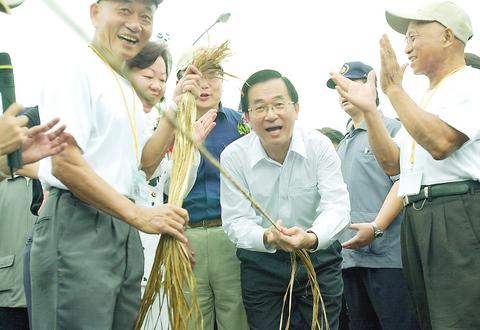Opposition politicians continued their chorus of criticism of President Chen Shui-bian (
Deviating from his original speech to the World Federation of Taiwanese Associations in Tokyo via teleconference on Saturday, Chen said that Taiwan and China are separate countries on either side of the Strait and that the legislature should consider passing a referendum law to protect its sovereignty.
"Chen's reckless remarks have tied the future and the well-being of Taiwan's 23 million people to the gunpowder keg of Taiwan independence," KMT Chairman Lien Chan (

PHOTO: CHIANG YING-YING, TAIPEI TIMES
Lien said Chen's comments calling for a referendum law hurt the nation's status quo, gravely jeopardized the well-being of the people of Taiwan, upset peace in the Taiwan Strait and undermined world political stability.
"The KMT will never allow Chen to act arbitrarily," Lien said.
The KMT chairman also accused Chen of not taking the nation and its people into account when making his "inappropriate" remarks, adding that not even the staff at the Presidential Office were aware beforehand what the president had planned to say Saturday.
KMT spokesman Wu Ching-ji (吳清基) said Chen's comments were triggered by personal emotions and showed he lacked the ability to make decisions with poise and wisdom.
Meanwhile, Chang Hsien-yao (張顯耀), director of the PFP's policy coordination center, said the president's remarks overestimated US support for Taiwan and miscalculated the potential for a strong reaction from Beijing.
Chang added that the people of Taiwan would be forced to bear the consequences of Chen's remarks if Beijing interprets his comments as a call for independence.
Joining the chorus of criticism, the PFP legislative caucus yesterday said Chen's comments lacked comprehensive consideration.
PFP Legislator Shen Chih-hwei (
Noting that Chen has taken an oath swearing allegiance to the nation's Constitution, Shen said she wanted to remind the president not to carry out any "unconstitutional deeds" such as pushing for a referendum on Taiwan independence and changing the nation's flag and official name simply because of his own pro-independence leanings.
"The PFP will oppose Taiwan independence by all means and block any referendum bills," Shen said.
Echoing Shen's comments, PFP legislator Lee Hung-chun (李鴻鈞) asked Chen not to rule the country "by slogans," ignore the welfare of the people or only have his personal interests in mind such as securing re-election.
PFP legislative whip Liu Wen-hsiung (劉文雄) said Chen's remarks have created suspicions among the public that independence is what Chen has had in mind all along.
See editorial:
Straight talk on Strait affairs

AIR SUPPORT: The Ministry of National Defense thanked the US for the delivery, adding that it was an indicator of the White House’s commitment to the Taiwan Relations Act Deputy Minister of National Defense Po Horng-huei (柏鴻輝) and Representative to the US Alexander Yui on Friday attended a delivery ceremony for the first of Taiwan’s long-awaited 66 F-16C/D Block 70 jets at a Lockheed Martin Corp factory in Greenville, South Carolina. “We are so proud to be the global home of the F-16 and to support Taiwan’s air defense capabilities,” US Representative William Timmons wrote on X, alongside a photograph of Taiwanese and US officials at the event. The F-16C/D Block 70 jets Taiwan ordered have the same capabilities as aircraft that had been upgraded to F-16Vs. The batch of Lockheed Martin

GRIDLOCK: The National Fire Agency’s Special Search and Rescue team is on standby to travel to the countries to help out with the rescue effort A powerful earthquake rocked Myanmar and neighboring Thailand yesterday, killing at least three people in Bangkok and burying dozens when a high-rise building under construction collapsed. Footage shared on social media from Myanmar’s second-largest city showed widespread destruction, raising fears that many were trapped under the rubble or killed. The magnitude 7.7 earthquake, with an epicenter near Mandalay in Myanmar, struck at midday and was followed by a strong magnitude 6.4 aftershock. The extent of death, injury and destruction — especially in Myanmar, which is embroiled in a civil war and where information is tightly controlled at the best of times —

China's military today said it began joint army, navy and rocket force exercises around Taiwan to "serve as a stern warning and powerful deterrent against Taiwanese independence," calling President William Lai (賴清德) a "parasite." The exercises come after Lai called Beijing a "foreign hostile force" last month. More than 10 Chinese military ships approached close to Taiwan's 24 nautical mile (44.4km) contiguous zone this morning and Taiwan sent its own warships to respond, two senior Taiwanese officials said. Taiwan has not yet detected any live fire by the Chinese military so far, one of the officials said. The drills took place after US Secretary

THUGGISH BEHAVIOR: Encouraging people to report independence supporters is another intimidation tactic that threatens cross-strait peace, the state department said China setting up an online system for reporting “Taiwanese independence” advocates is an “irresponsible and reprehensible” act, a US government spokesperson said on Friday. “China’s call for private individuals to report on alleged ‘persecution or suppression’ by supposed ‘Taiwan independence henchmen and accomplices’ is irresponsible and reprehensible,” an unnamed US Department of State spokesperson told the Central News Agency in an e-mail. The move is part of Beijing’s “intimidation campaign” against Taiwan and its supporters, and is “threatening free speech around the world, destabilizing the Indo-Pacific region, and deliberately eroding the cross-strait status quo,” the spokesperson said. The Chinese Communist Party’s “threats